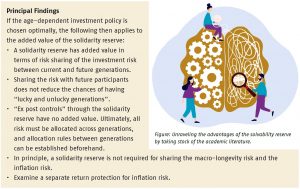The advantages of the solidarity reserve unraveled
“Ex post controls through solidarity reserve have no added value”
The solidarity reserve is a new element in the Dutch pension agreement. This reserve may be used towards intergenerational risk sharing. We have drawn on the academic literature to identify how the solidarity reserve can contribute to risk-sharing between generations and what the implications are for the solidarity reserve’s setup. The Explanatory Memorandum of the Ministry of Social Affairs and Employment lists four advantages and we have used this study to unravel these claimed advantages.
The four advantages set out by the Ministry of Social Affairs and Employment:
- The investment risk will be shared between current and future generations
- The differences between “lucky” and “unlucky” generations will be cushioned
- The macro-longevity risk will be shared between generations
- The risk of inflation will be shared between generations

Key Takeaway for the Industry
Contrary to popular belief, risk sharing under optimal policies with future generations does not reduce the risk for each generation – and therefore does not reduce the number of “lucky and unlucky” generations. Instead, it leads to more investment risk and a higher expected pension for future participants.


